Best CRM for small businesses – Boost Your Business
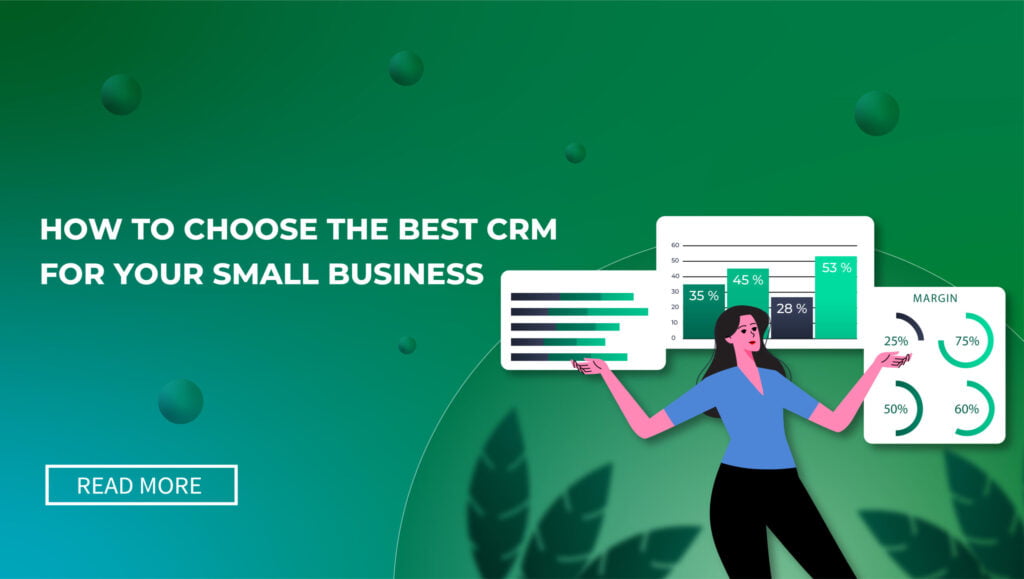
As a small business owner, you wear many hats – From managing inventory to providing top-notch customer service, your plates are always full. Maintaining strong connections with your customers is vital for small business success.
But with limited resources and personnel, it’s tricky to balance it all! Right? This is where implementing customer relationship management (CRM) software can make a game-changing difference.
between stretched budgets and no dedicated IT specialist on staff, finding the right CRM solution can feel overwhelming for small businesses. How do you know what platform makes the most sense for your unique needs? What features are must-haves compared to nice-to-haves? Let’s Find out!
Small Businesses CRM: What is it?
Customer relationship management (CRM) platforms consolidate all customer data into a single centralized database, gathering information from lead forms, landing pages, websites, email, social media, and other channels. With a 360-degree view of customer interactions, small businesses can enable sales teams to initiate, nurture, and close more deals. The software provides critical tools for managing tasks like contact management, email automation, appointment scheduling, pipeline tracking, forecasting, and reporting.
Beyond sales enablement, Small business CRM systems also streamline customer-facing processes including support, retention programs, loyalty initiatives, and referral tracking. The right solution empowers small businesses to strengthen customer relationships and boost revenue through shortened sales cycles, improved close rates, and maximized customer lifetime value.
“According to Studies,75% of SMB owners say a CRM is crucial for creating personalized customer experiences “
Why you should move from spreadsheets to CRM (Stats)
- CRM users see a 34% increase in sales productivity.
- CRMs can boost customer retention by 27%.
- Sales conversion rates improve by 300% with CRM.
- CRMs increase data accessibility by 24%.
- The average ROI on CRM investment is $8.71 for every dollar spent.
Difference between small business CRM and enterprise CRM:
| Feature | Small Business CRM | Enterprise CRM |
| Features | Focused on core functionalities (contact, lead, and sales management) | Extensive features including advanced automation, marketing tools, and customization options |
| Cost | Lower cost of ownership, cheaper licensing models | Expensive, often requiring long-term contracts |
| Ease of use | Simpler interface, easy for non-tech users | More complex with steeper learning curve |
| Integration | Integrates with popular small business tools | Integrates with complex enterprise systems |
| Implementation | Quick onboarding and setup | Long and complex deployment process |
| Support | Online help, email/phone support | Dedicated technical support and advisors |
| Security | Standard security protections | Robust security and controls for sensitive data |
How a Small Business CRM can benefit your business?
- Keeps all customer information in one place – Rather than having customer data like emails, phone numbers, and notes scattered in different places, a CRM stores it all in one centralized database. This makes it easy to find and access.
- Tracks interactions automatically – A CRM logs emails sent, calls made, meetings held with each customer. This way you have a history of all interactions that you can look back on.
- Helps manage leads and sales – CRMs organize leads and deals by various stages in the sales process. You can see what stage each potential sale is at – new lead, contact made, proposal sent, contract signed etc.
- Improves customer service – Since data on customers is all in one place, any employee can quickly get up to speed on a customer to provide good service. Past interactions are documented right there as well.
- Provides insights on customers – CRM analytics show key metrics relating to customers – how many sales made, revenue by customer, sales cycle length and more. This helps guide business decisions.
- Works anytime, anywhere – CRMs are web-based or cloud based. So you can access the customer data from wherever you are with whatever device – phone, laptop, tablet. This mobility helps access and update data faster.
Read more: benefits of crm
15 Best CRM software for small business 2024
1. SalesTown CRM: Best CRM Software for Small Business & Startups
Overview: SalesTown is an intuitive, cloud-based CRM for small and mid-sized businesses. It helps manage sales, marketing, and customer service efficiently. With its simple interface and robust features, SalesTown is ideal for growing businesses looking for a comprehensive CRM solution.
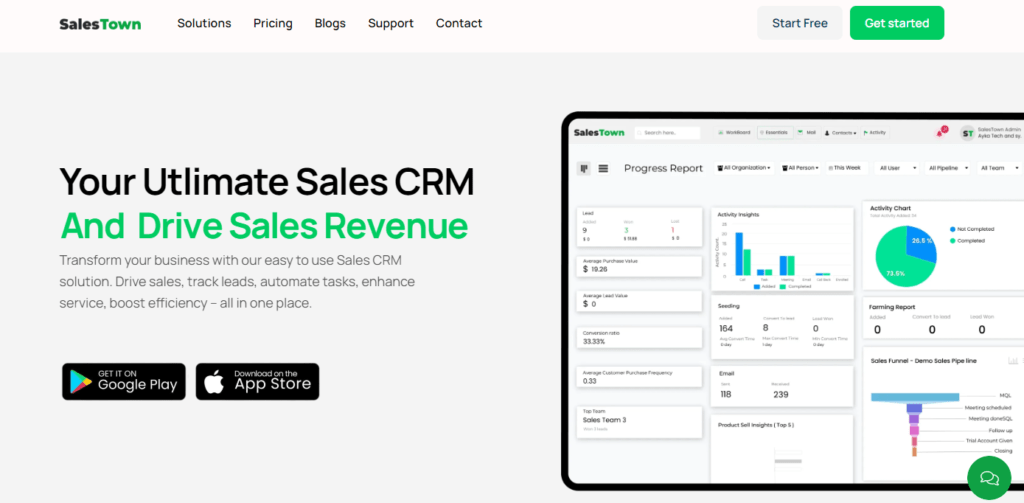
Key Features
- Contact Management: Keep track of customer details and interactions in one place.
- Sales Pipeline and Forecasting: Visualize and manage the sales process from lead to closure.
- Activity Scheduler and Reminder System: Schedule tasks and set reminders to stay on top of customer interactions.
- Customer Support Ticketing: Manage customer service requests efficiently.
- Reporting and Analytics: Generate detailed reports to gain insights into sales and customer service performance.
- Customizable Sales Pipelines: Tailor the sales process to fit your business needs.
- Email Marketing: Send and track email campaigns directly from the CRM.
- Mobile Access: Access the CRM from mobile devices for on-the-go management.
- Top-Notch Customer Support: Receive excellent support to resolve any issues.
Pros
- User-friendly interface
- Comprehensive feature set
- Excellent customer support
- Affordable pricing
Cons
- Limited advanced automation features
2. HubSpot CRM: Best Free CRM for Small Business
Overview: HubSpot CRM is a free, web-based CRM that integrates seamlessly with HubSpot’s powerful marketing software. It is particularly suited for small businesses that need strong sales and marketing automation.
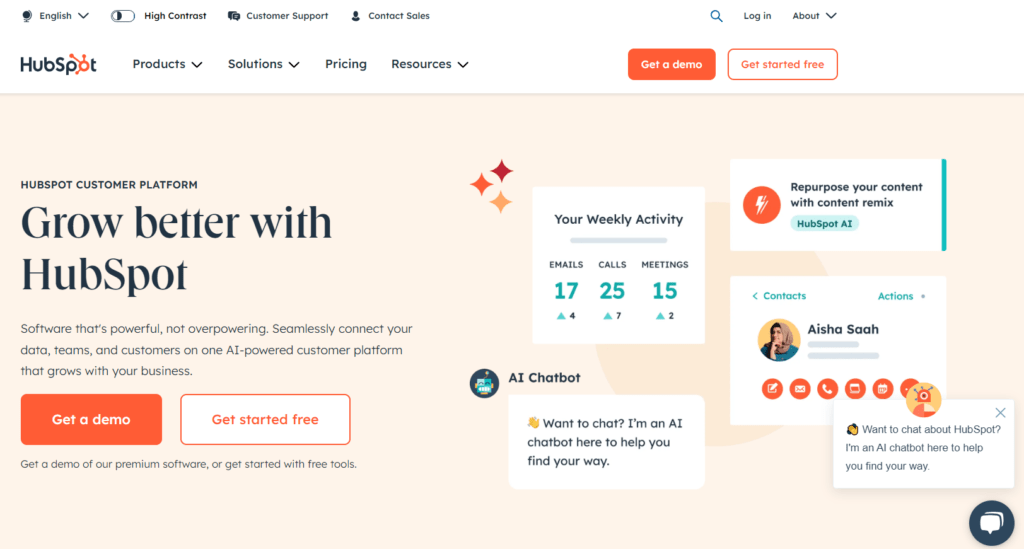
Key Features
- Contact and Deal Tracking: Manage and track contacts and deals in one place.
- Email Integration: Sync emails for seamless communication.
- Landing Pages and Forms: Create landing pages and forms to capture leads.
- Sales Analytics and Reporting: Generate reports to analyze sales performance.
Pros
- Free to start
- Strong sales and marketing automation
- Easy to use
- Seamless integration with other HubSpot tools
Cons
- Can become expensive with advanced features
- Limited customization
3. Zoho CRM: Best Affordable CRM for Small Business
Overview: Zoho CRM is a flexible, sales CRM software with extensive features and integrations. It is tailored for small businesses looking for a scalable and affordable CRM solution.

Key Features
- Sales Pipeline Management: Visualize and manage the sales process.
- Marketing Automation: Automate marketing tasks to improve efficiency.
- Customer Service and Support: Manage customer support tickets and service requests.
- Customizable Reports and Dashboards: Create custom reports and dashboards to monitor performance.
Pros
- Affordable pricing
- Extensive features
- Strong integration capabilities
- Scalable for growing businesses
Cons
- Can be complex for beginners
- Limited advanced customization
4. Freshsales: Best Sales-Focused CRM for Small Business
Overview: Freshsales is a sales-focused CRM designed for high-growth small businesses. It offers powerful tools for lead, deal, and account management, helping businesses streamline their sales processes.
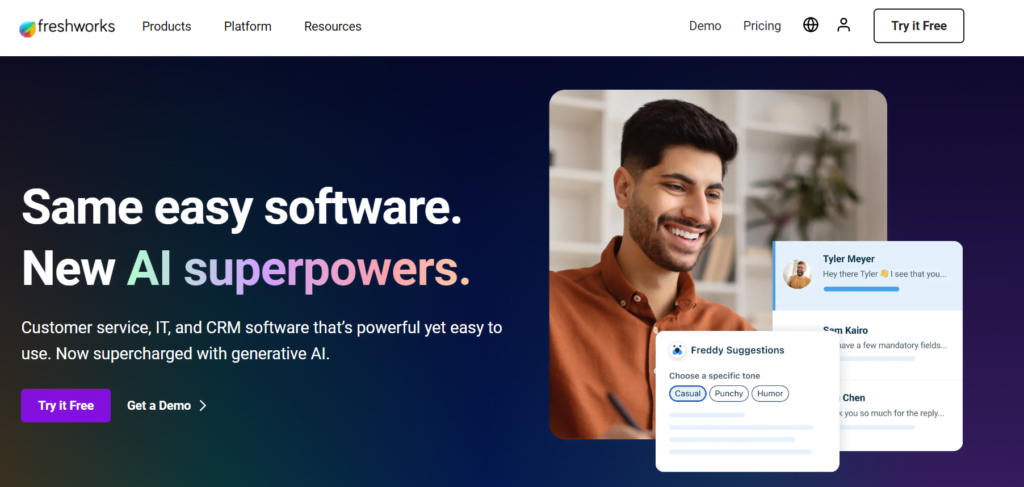
Key Features
- Lead Scoring and Tracking: Score and track leads to prioritize follow-ups.
- Built-In Phone with Call Logging: Make calls directly from the CRM and log them automatically.
- Conversation Timeline: View a timeline of all interactions with each contact.
- Sales Analytics and Reports: Generate reports to analyze sales data.
Pros
- Easy to use
- Strong lead management
- Built-in phone functionality
- Excellent reporting tools
Cons
- Limited marketing features
- Higher pricing for advanced plans
5. Insightly: Best CRM for Outlook Integration for Small Business
Overview: Insightly CRM emphasizes contact management and pipelines for small business sales teams. It integrates well with Outlook and Gmail, making it a great choice for businesses using these tools.
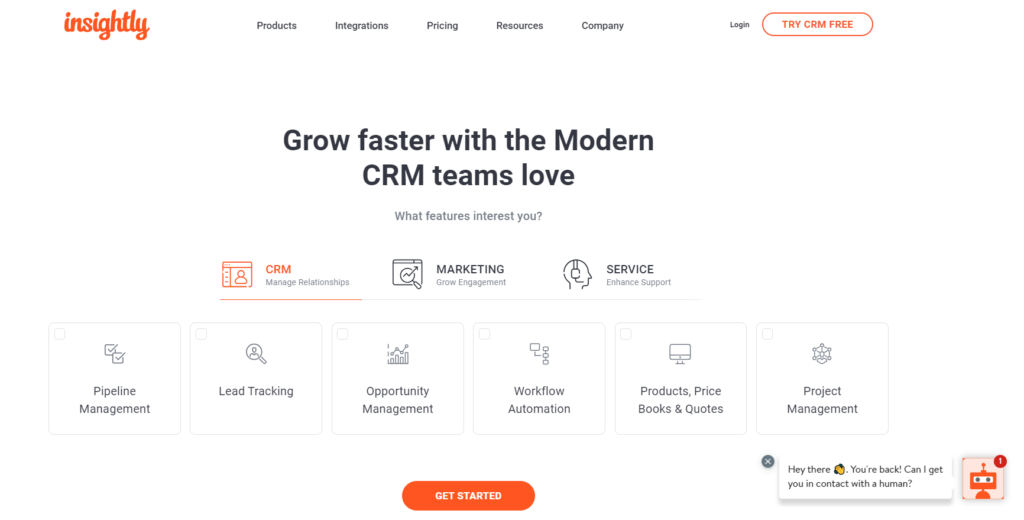
Key Features
- Contact Management: Keep detailed records of contacts and interactions.
- Opportunity Pipeline: Manage sales opportunities from start to finish.
- Outlook Sync: Sync with Outlook for seamless email and calendar integration.
- Gmail Integration: Integrate with Gmail for smooth communication.
- Mobile Apps: Access CRM features on mobile devices.
Pros
- Strong integration with Outlook and Gmail
- User-friendly interface
- Mobile access
- Good for contact management
Cons
- Limited advanced features
- Can be pricey for small businesses
6. Apptivo: Best Customizable CRM for Small Business
Overview: Apptivo is an affordable CRM solution built for small and mid-sized businesses. It offers modules for marketing, sales, and customer service, providing a comprehensive toolset for managing customer relationships.
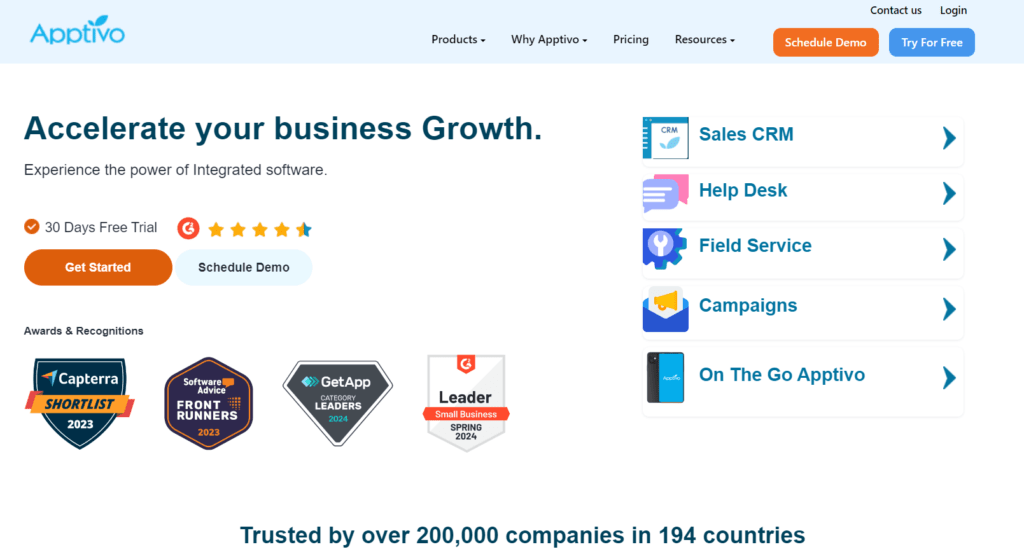
Key Features
- Contact Management: Keep track of customer details and interactions.
- Opportunity Tracking: Manage sales opportunities effectively.
- Marketing Automation: Automate marketing tasks to save time and improve efficiency.
- Ticket Management: Handle customer service requests seamlessly.
- Customizable Reports: Create reports to gain insights into business performance.
Pros
- Affordable pricing
- Comprehensive feature set
- Strong customization options
- User-friendly interface
Cons
- Limited integration capabilities
- Can be complex for new users
7. Pipedrive: Best Visual Sales Pipeline CRM for Small Business
Overview: Pipedrive is a sales-focused CRM designed to help small businesses manage and streamline their sales processes. It offers a visual pipeline and intuitive interface to keep track of deals and activities.
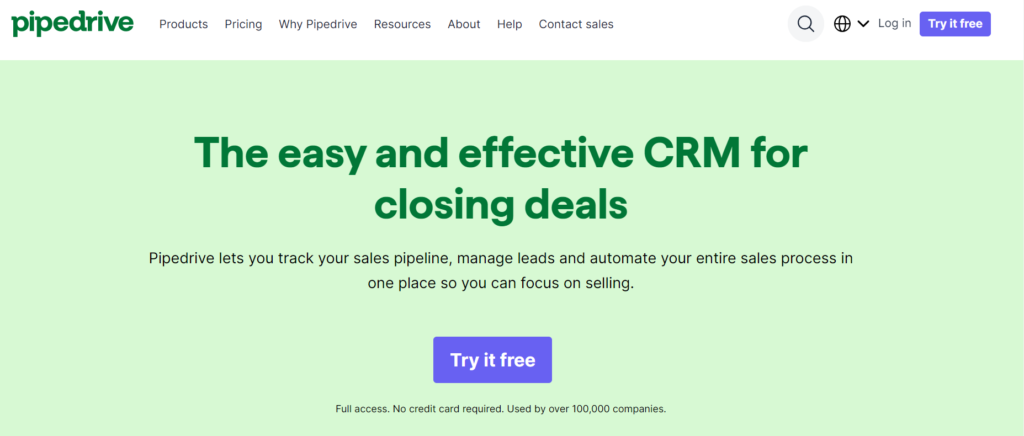
Key Features
- Visual Sales Pipeline: Visualize the sales process and track deals easily.
- Activity Management: Schedule and track activities to stay on top of sales tasks.
- Email Integration: Sync emails to manage communications within the CRM.
- Sales Reporting: Generate reports to analyze sales performance.
Pros
- User-friendly interface
- Strong sales pipeline management
- Good email integration
- Effective activity management
Cons
- Limited advanced features
- Can be expensive for larger teams
8. Nimble: CRM with Social Media Integration for Small Business
Overview: Nimble is a simple yet powerful CRM that focuses on social media integration and contact management. It is ideal for small businesses looking to manage customer relationships through social channels.
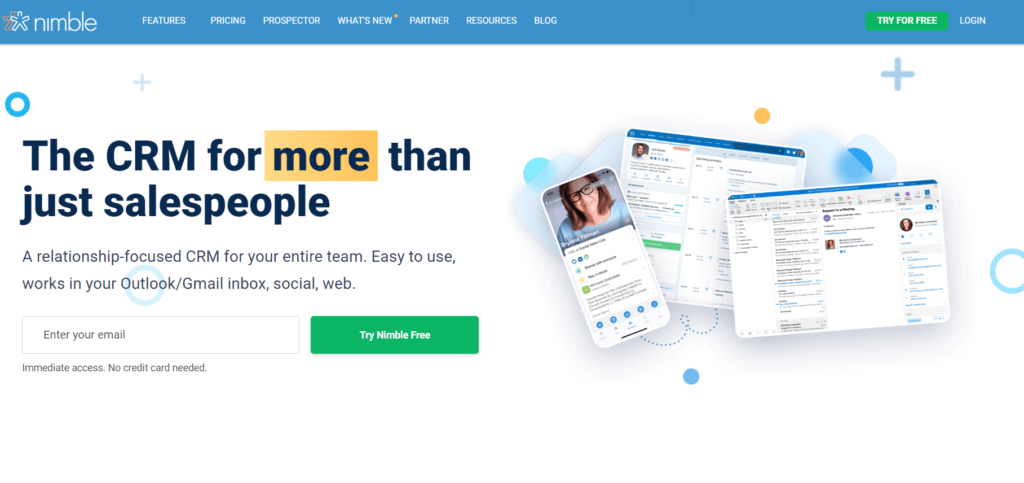
Key Features
- Contact Management: Keep detailed records of customer interactions.
- Social Media Integration: Integrate with social media platforms to manage customer interactions.
- Activity Tracking: Track activities and follow-ups to stay organized.
- Integrated Email and Calendar: Sync emails and calendars for seamless communication.
Pros
- Excellent social media integration
- Easy to use
- Good contact management
- Affordable pricing
Cons
- Limited advanced features
- Basic reporting capabilities
9. Agile CRM: All-in-One CRM for Small Business
Overview: Agile CRM is an all-in-one CRM solution for small businesses, offering tools for sales, marketing, and customer service. It is designed to help businesses manage customer relationships and grow efficiently.
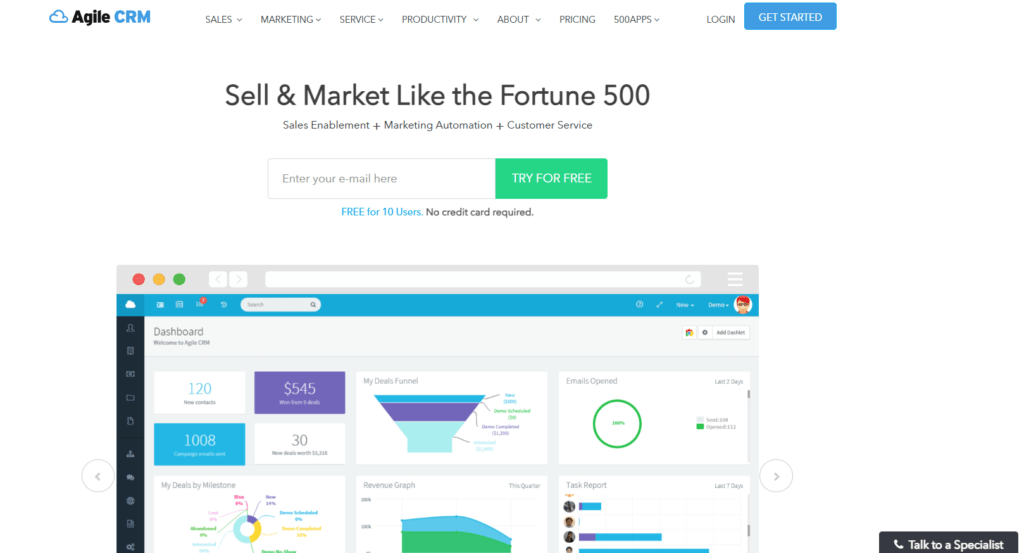
Key Features
- Contact Management: Store and manage customer information in one place.
- Marketing Automation: Automate marketing tasks to improve efficiency.
- Sales Automation: Streamline sales processes with automation tools.
- Customer Service: Manage customer service tickets and requests.
Pros
- Comprehensive feature set
- Affordable pricing
- Strong automation capabilities
- User-friendly interface
Cons
- Limited customization options
- Can be complex for beginners
10. Capsule CRM: Best Simple CRM for Small Business
Overview: Capsule CRM is a simple yet effective CRM solution designed for small businesses. It focuses on contact management and sales tracking, making it easy to manage customer relationships and sales processes.
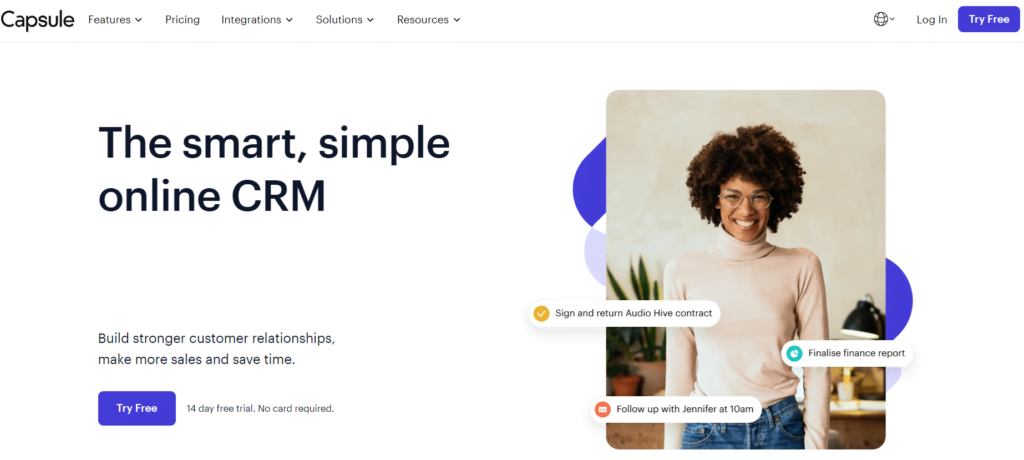
Key Features
- Contact Management: Keep track of customer details and interactions.
- Sales Tracking: Track sales opportunities and progress through the sales pipeline.
- Task Management: Schedule tasks and set reminders to stay organized.
- Integration: Integrate with popular tools like G Suite and Microsoft Office.
Pros
- Simple and intuitive interface
- Good contact management
- Affordable pricing
- Easy to set up and use
Cons
- Limited advanced features
- Basic reporting capabilities
11. Monday.com CRM: Best Project Management Integration for Small Business
Overview: Monday CRM is known for its Best project management tools with CRM functionalities. It’s ideal for small businesses that need to manage projects and customer relationships in one platform.
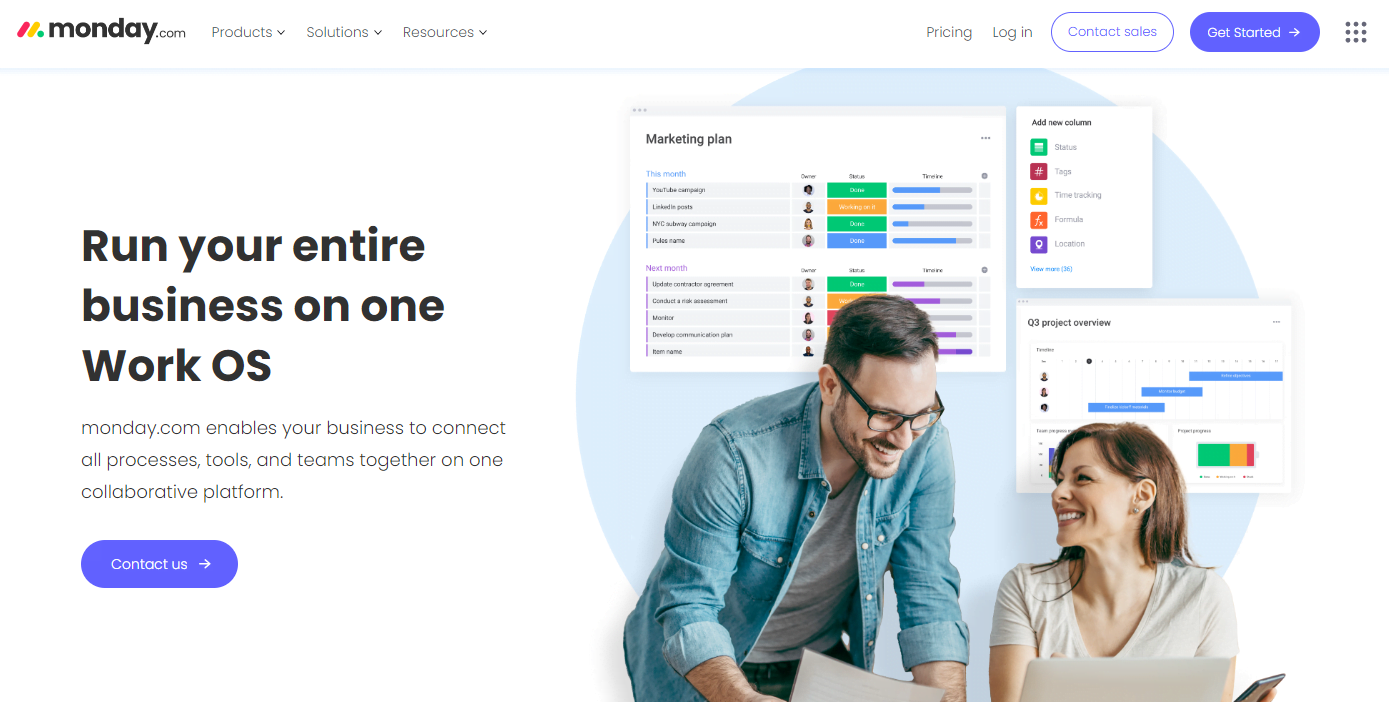
Key Features
- Visual Sales Pipeline: Easily manage and track the progress of deals.
- Project Management Tools: Integrate CRM with project management features.
- Automation: Automate repetitive tasks to save time.
- Customizable Dashboards: Tailor dashboards to fit your business needs.
- Collaboration Tools: Collaborate with team members on sales and project tasks.
Pros
- Excellent project management integration
- Highly customizable
- User-friendly interface
- Strong automation capabilities
Cons
- Can be pricey with advanced features
- Requires some learning to maximize potential
12. Bitrix24: Best All-in-One CRM for Small Business
Overview: Bitrix24 is an all-in-one business suite offering CRM, project management, and collaboration tools. It’s designed for small businesses that need a comprehensive solution to manage various aspects of their operations.
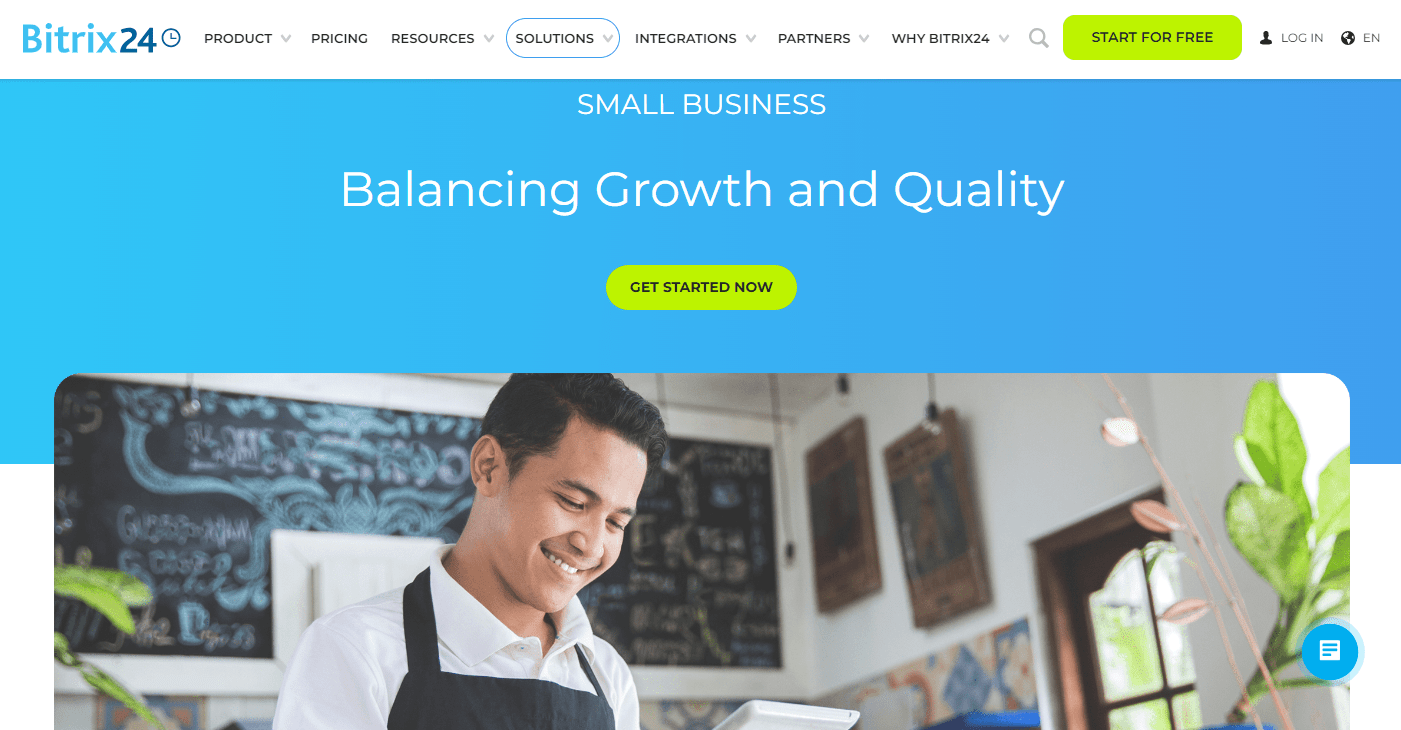
Key Features
- Contact Management: Store and manage customer details efficiently.
- Sales Automation: Automate sales processes to improve productivity.
- Marketing Tools: Utilize email marketing and social media integration.
- Project Management: Manage projects and tasks within the same platform.
- Communication Tools: Integrated chat and video conferencing for team collaboration.
Pros
- Comprehensive all-in-one solution
- Affordable pricing
- Strong communication tools
- Extensive features for sales and project management
Cons
- Can be overwhelming for new users
- Limited customization options for advanced users
13. Streak CRM: Best small business CRM for Gmail Integration
Overview: Streak CRM is built directly into Gmail, making it a convenient choice for small businesses that heavily rely on Google’s email service. It allows users to manage contacts, track sales, and automate workflows without leaving their inbox.
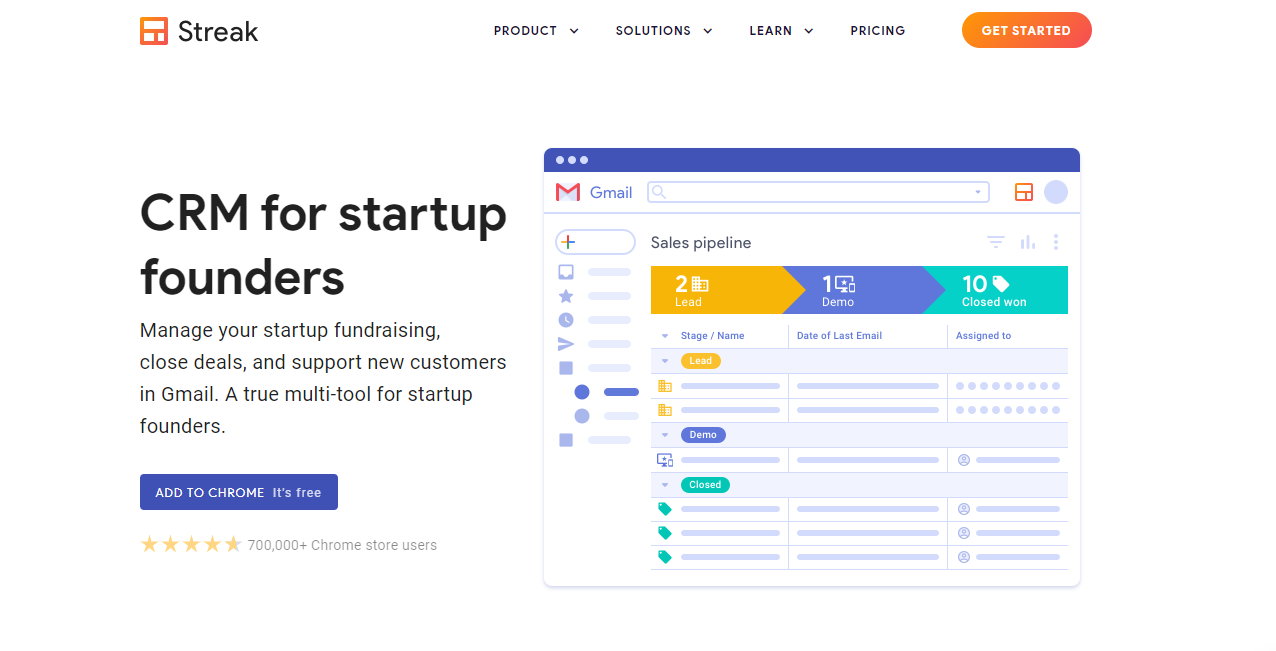
Key Features:
- Gmail Integration: Seamlessly integrates with Gmail for email tracking and management.
- Sales Pipelines: Create and manage sales pipelines directly within your email.
- Customizable Workflows: Tailor workflows to fit your business processes.
- Collaboration Tools: Share emails, contacts, and pipelines with your team.
- Mobile App: Access CRM features on the go with the mobile app.
Pros:
- Direct integration with Gmail
- Easy to use within familiar email interface
- Customizable workflows
- Affordable pricing for small teams
Cons:
- Limited advanced features
- Best suited for Gmail users
14. Less Annoying CRM: Best Simple and Affordable CRM for small business
Overview: Less Annoying CRM is designed to be straightforward and affordable for small businesses. It focuses on simplicity and ease of use, making it an excellent choice for those new to CRM software.
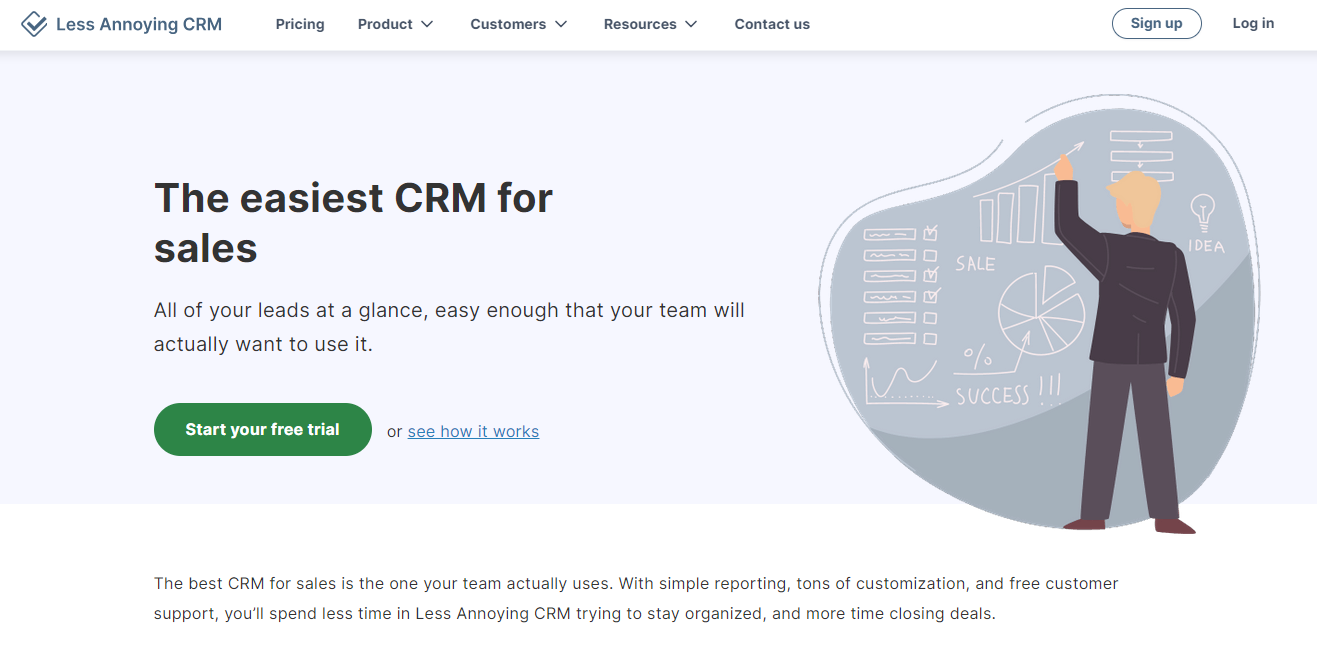
Key Features:
- Contact Management: Store and manage customer details easily.
- Task and Event Tracking: Schedule tasks and events to stay organized.
- Simple Reporting: Generate basic reports to monitor business performance.
- Calendar Integration: Integrate with your calendar for seamless scheduling.
- Mobile Access: Access the CRM from any device.
Pros:
- Very easy to use
- Affordable pricing
- Simple and effective features
- Excellent customer support
Cons:
- Limited advanced features
- Basic reporting capabilities
15. Copper CRM: Best small business CRM for G Suite Users
Overview: Copper CRM is specifically designed for businesses using G Suite. It integrates smoothly with Google Workspace, providing a seamless experience for managing contacts and sales activities within the familiar Google environment.
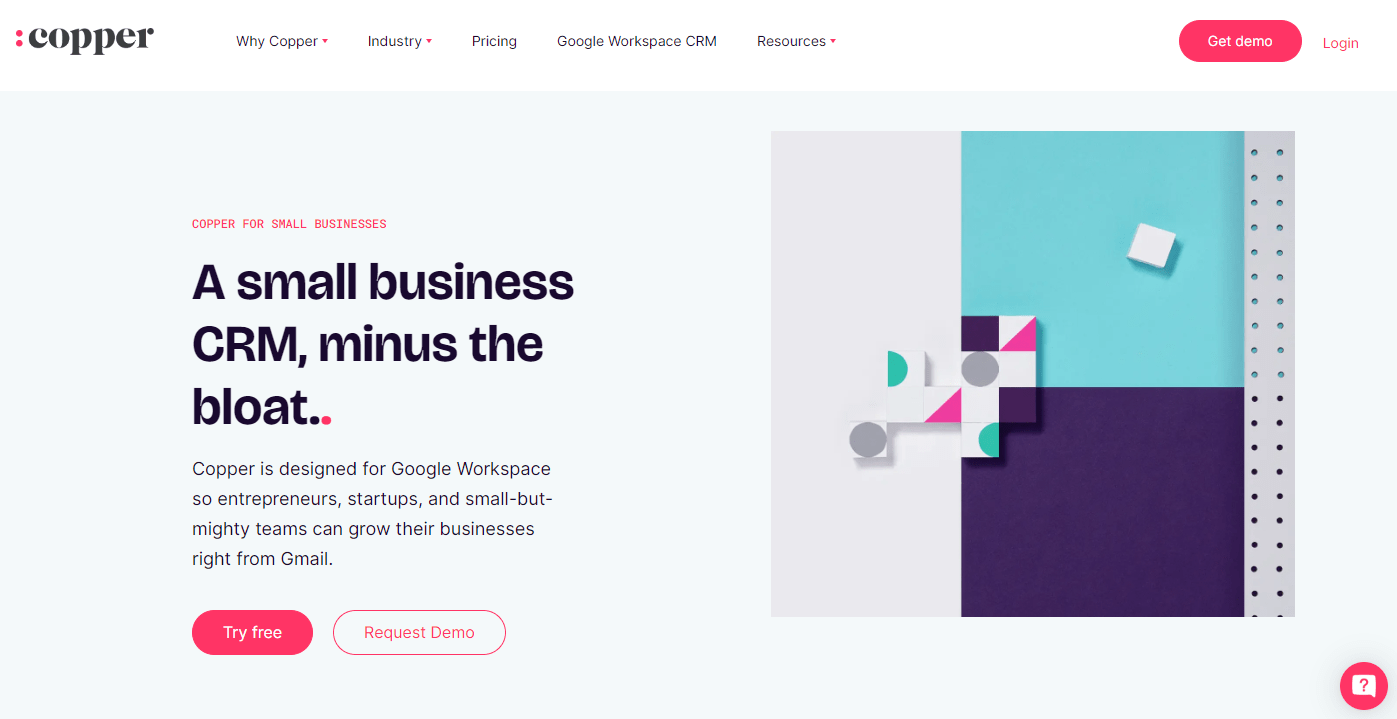
Key Features:
- G Suite Integration: Deep integration with Google Workspace for email, calendar, and drive.
- Automated Data Entry: Automatically updates records based on email interactions.
- Pipeline Management: Visualize and manage your sales pipeline.
- Task Management: Create and track tasks and reminders.
- Mobile App: Access CRM features on mobile devices.
Pros:
- Seamless integration with G Suite
- Automated data entry saves time
- User-friendly interface
- Good for managing sales activities
Cons:
- Can be expensive for larger teams
- Limited customization options
What to Look for in CRM Software for Small Business
When choosing CRM software for your small business, evaluate your marketing plan and whether your main focus is on your sales team, Integration capabilities, or creating contact lists from web forms. Here are some points to consider when evaluating products:
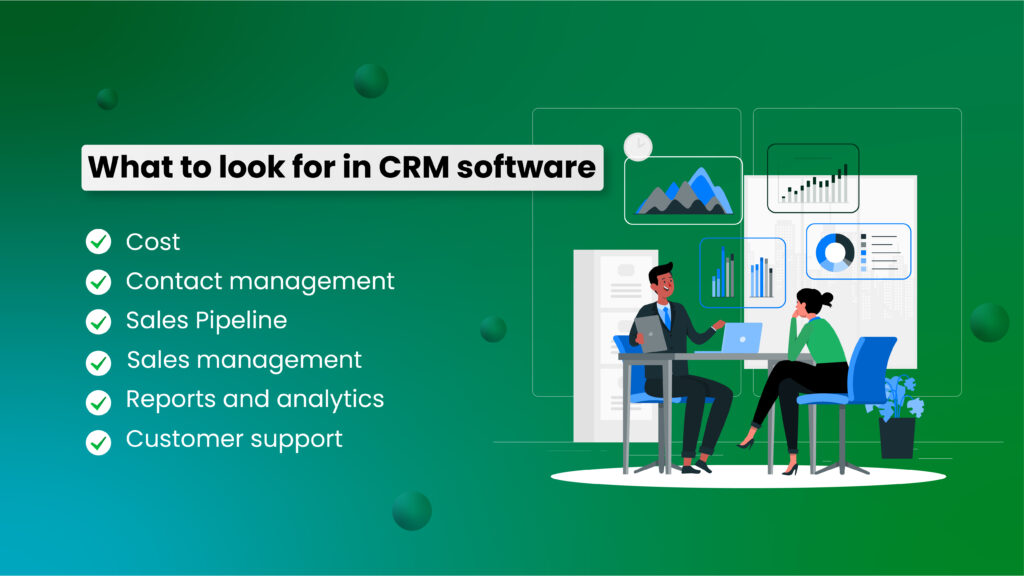
Cost
Most providers offer a variety of options that allow you to scale up as necessary. Usually, you pay a monthly cost per user. Keep an eye out for minimum user needs to avoid misunderstanding the total monthly cost. When you pay annually, you often get a discount, but keep in mind that the charge isn’t always refundable if you wish to cancel after a few months. Some suppliers provide a free trial, which allows you to try the product without making a commitment. Free plans are another option for testing products, although their features are often limited.
Contact Management
Contact management is key to the top CRM systems. Automatic customer data syncs and website lead capture capabilities can aid in the development of contact lists.This data includes client information, communication history, preferences, and other information, allowing organizations to personalize interactions and provide better customer experiences.
Sales Pipeline
In CRM (Customer Relationship Management), a sales pipeline is a graphical representation of the steps that a potential customer or lead goes through as they proceed from initial contact to closed deal. It provides an established structure for sales teams to track and manage prospect interactions. The pipeline typically consists of various stages, such as lead generation, qualification, proposal, negotiation, and closing.The pipeline is used by sales professionals to prioritize their efforts, estimate revenue, and provide an organized strategy to converting leads to customers.
Sales force Management
If you have a sales team, a CRM system with sales management tools could help you in maximizing the efforts of your employees. Built-in phone, and chat options, for example, can make it easier to contact with leads who come through your website. Customer data syncs, tracking, and notifications may also help in the establishment of relationships with customers.
Reports and Analytics
In some circumstances, pre-built reports are given by most CRM software. Businesses that spend a significant amount of their marketing budget on online sales, on the other hand, will most certainly desire the ability to customize their reports. Additionally, organizations who use web forms to generate leads will likely be interested in software that provides website analytics and report allows for deeper data research, providing predictive and prescriptive insights that can improve customer segmentation, personalize marketing activities, and boost overall customer satisfaction.
Customer Support
CRM service companies give a wide range of help with CRM customer portal Some companies only provide support during the week, while others offer it 24/7. It involves a systematic approach to addressing customer inquiries, issues, and feedback, with the goal of ensuring their satisfaction and loyalty. Each company must assess what amount of support is appropriate for their needs. Because individually setup support is rare, search for suppliers who give help libraries, tutorials, and training webinars to aid you in getting the most out of the product.
Data Privacy
CRM (Customer Relationship Management) solutions are critical in guaranteeing data privacy for organizations and their customers. CRM software offers a structured and secure environment for gathering, storing, and managing customer data. CRM systems help preserve sensitive information by implementing strict user access controls and encryption techniques.
CRM platforms also enable businesses to establish data retention and deletion policies, ensuring compliance with data protection standards such as GDPR or CCPA. CRM solutions allow firms to track and monitor data usage through comprehensive audit logs and reporting tools, making it easier to identify and correct any breaches or abnormalities as soon as possible.
Is a CRM useful for small businesses?
In short : Yes, CRM Software useful for small business
Small businesses often face the challenge of building and maintaining strong customer relationships on a limited budget. A CRM can help in this situation by providing a centralized platform for tracking customer interactions, managing leads, and personalizing messages. Small businesses can customize their marketing tactics and deliver more personalized customer service by organizing and analyzing client data, ultimately leading to higher customer satisfaction and loyalty. A CRM system can be a lifeline in today’s competitive market, allowing small businesses to flourish and develop in a customer-centric atmosphere.
It’s not just a tool; it’s the architect of personalized connections. For small businesses, where every interaction carries immense value, a CRM becomes the custodian of these relationships. It’s the digital memory that never forgets a customer’s name or their preferences. It transforms scattered data into actionable insights, helping businesses make smarter decisions.
SalesTown CRM: a simple CRM Software for small business needs
Running a small business is tough. As an owner, you juggle countless tasks and wear many hats. Shouldn’t growing your customer base be easier? SalesTown CRM empowers entrepreneurs like you to build lasting customer relationships, the easy way. Our simple yet powerful cloud software is designed for non-technical users.
- Stay Organized: Ditch the messy spreadsheets and sticky notes. Store and manage all your customer information, including contact details, purchase history, and communication records, in a centralized, easy-to-access platform.
- Close More Deals: Never miss a lead again! Track your leads through every stage of the sales funnel, automate follow-up emails, and schedule appointments with ease. SalesTown keeps you on top of your sales game, helping you convert more leads into paying customers.
- Focus on What Matters: Automate repetitive tasks like sending emails and scheduling appointments, freeing up your valuable time to focus on building relationships with your customers and growing your business.
- Gain Valuable Insights: Get clear and actionable reports on your sales performance. See which marketing efforts are working, identify areas for improvement, and make data-driven decisions to boost your bottom line.
- Work Anytime, Anywhere: Access your data and manage your sales pipeline on the go with the SalesTown mobile app. Perfect for busy entrepreneurs who are always on the move!
Easy to implement, learn, and use – you’ll be up and running in no time. Plus, our outstanding onboarding coach will get you CRM-Confident quickly. Sign up for a FREE Demo of SalesTown CRM today and see how it can help you
2024 CRM Trends:
AI and Automation: AI and machine learning are expected to play an increasingly significant part in CRM systems. AI can aid with lead scoring, chatbots for customer service, predictive analytics, and personalization, all of which can improve the efficiency and effectiveness of customer interactions.
Mobile CRM: Mobile CRM software will become increasingly important as mobile device usage grows, allowing sales and support personnel to access key information and communicate with customers on the move.
Omnichannel Customer Engagement: Customers want a consistent experience across all channels (website, email, social media, phone, chat, and so on). CRM solutions will almost certainly prioritize offering a single view of customer interactions and data across different channels.
Voice Assistants and Voice Search: CRM systems may combine with voice technologies to create more convenient and natural interactions as voice-activated devices and search become more common. it will enable businesses to engage with customers through voice commands.
“Gartner predicts that by 2025, AI and machine learning will be used in 90% of new CRM implementations to enhance customer experience.”
Frequently Asked Questions ( Faqs )
1. What is CRM, and why do small businesses need it?
CRM, or Customer Relationship Management, is a software solution designed to help businesses manage and analyze customer interactions throughout the entire customer lifecycle. For small businesses, CRM is essential for organizing customer data, streamlining communication, and improving overall customer satisfaction.
2. How can CRM benefit a small business?
CRM can benefit small businesses by centralizing customer information, automating routine tasks, and enhancing communication. It helps businesses build stronger relationships with customers, improves sales and marketing efforts, and provides valuable insights to make informed business decisions.
3. Is CRM only for sales teams, or can other departments benefit from it in a small business?
While CRM is often associated with sales, its benefits extend beyond sales teams. Other departments, such as marketing and customer support, can leverage CRM to streamline processes, enhance collaboration, and ensure a consistent customer experience across the entire business.
4. How can a small business get started with CRM?
Getting started with SalesTown CRM is easy. Begin by identifying your business needs and goals. Explore SalesTown’s website, take advantage of any free trials or demos offered, and reach out to their support team for guidance. The step-by-step onboarding process ensures a smooth integration into your small business operations.
Tags:-
